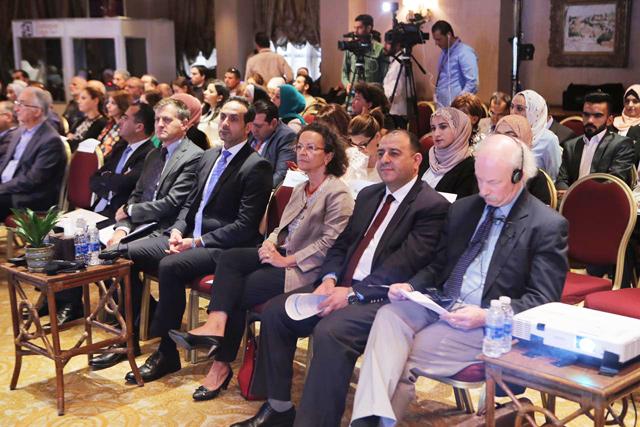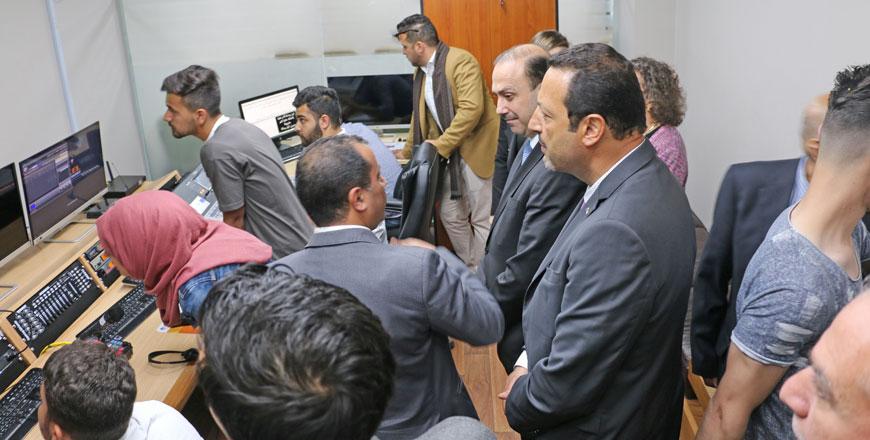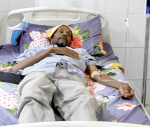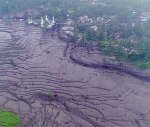You are here
‘Four-year support project helped change Jordan’s media landscape’
By Rana Husseini - Oct 18,2018 - Last updated at Oct 18,2018

Over 100 partners, stakeholders, beneficiaries and representatives of the donor community celebrate the results of the project in Amman, on Thursday (Photo courtesy of EU/UNESCO)
AMMAN — “My experience and what I learned from the Support to Media in Jordan is only the beginning of what is waiting ahead of me in my new career,” said Atheer Manaseer, one of the dozens of youths, media professionals and entities who celebrated the end of the four-year “Support to Media in Jordan” (STMJO) project on Thursday.
“My family wanted me to become an engineer but I wanted to become a journalist and the media project helped me achieve my dreams,” Manaseer told over 100 partners, stakeholders, beneficiaries and representatives of the donor community gathered to celebrate the results of the project implemented by UNESCO Amman Office and the European Union.
Manaseer said the project helped her grasp the rules and ethics of media and understand the values of news, among other skills.
Abeer Naimi, the principal of Bint Adi School for Girls, also described how the project empowered students from grades seven to nine, their teachers, their families and the community as a whole.
“This is the best project that was implemented in our school, because we were able to raise the awareness of these students about what to expect later on in their lives and they carried their experience to their families and community,” Naimi said.
Launched in 2014, the project recently benefited from additional funding from Canada through a project implemented by the UNESCO Amman office and the UN Office of Counter-Terrorism (UNCCT), according to the organisers.
Deputising for Minister of State for Media Affairs Jumana Ghunaimat, patron of the event, Director of the Media Commission Mohammad Qtaishat thanked the EU and UNESCO for "their great efforts" to make STMJO a success, by supporting many initiatives with media and academic institutions over the past four years.
He stressed the government's keenness to continue the partnership with the EU and UNESCO through new programmes and activities.
Costanza Farina, UNESCO Representative to Jordan, commended the EU's generous support “based on the shared belief that a free, independent media constitutes a cornerstone of democracy".
“The stories of the partners and beneficiaries today are a testament to the major investments made and we are pleased to share a sample of the significant results with you today,” Farina added.
Built on a media strategy and action plan adopted by the Jordanian government in 2011, STMJO focused on the media sector as a platform for democratic dialogue and a crucial instrument to transparency and accountability in a democratic society.
Phase one of the project entailed developing a media study, a stakeholder-driven review of the implementation of the media strategy and detailing of the action plan, before producing a thorough analysis of the media landscape on the basis of UNESCO’s Media Development Indicators (MDI).
In the second phase, the project addressed the priority recommendations of the MDI study, focusing on suggested improvements of the legal framework, entry-level journalism education, systematic quality training for media professionals, media and information literacy, strengthening community media, supporting the establishment of an independent self-regulatory mechanism and diversity and pluralism in the media.
In addition, equipment was provided as part of a 1.5 million euro ($1.72 million) contribution to several universities and local radio stations, designed to increase the ability of beneficiaries to offer high quality media content that would reflect the local realities.
EU Ambassador to Jordan Andrea Matteo Fontana underlined the importance of supporting media actors as partners for inclusive development and democracy, noting that the EU continues to support national efforts to promote the constructive role of media in promoting community engagement and addressing the national priority initiatives, such as advancing political participation and preventing violent extremism.
He said one of the project's achievements was providing students with better opportunities to become media professionals, supporting community radios and proposing key reforms.
UNESCO consultant and lead researcher of the MDI study, Toby Mendel, delivered a keynote speech in which he described the consultative process of the MDI study, as well as the work on the media legislation framework.
The design of the project was well integrated in a solid way, and “the organisers involved very strong partners and we could see that from the testimonies today of how much people appreciated the really concrete things that were achieved”, he told The Jordan Times.
While the STMJO project is coming to an end, UNESCO remains committed to advocating and promoting media freedom and professionalism in Jordan and will continue to build on the achievements of this project, according to an organisers' statement.
Related Articles
AMMAN — The European Union and UNESCO Amman office on Monday celebrated the provision of new radio and studio equipment to the Middle East U
AMMAN — UNESCO Amman office on Wednesday launched the “Youth Media Perceptions” discussion papers, as part of an initiative under the region
AMMAN — Minister of Culture Bassem Tweissi on Thursday reiterated the Kingdom’s commitment to boosting Media Information Literacy (MIL) amon














